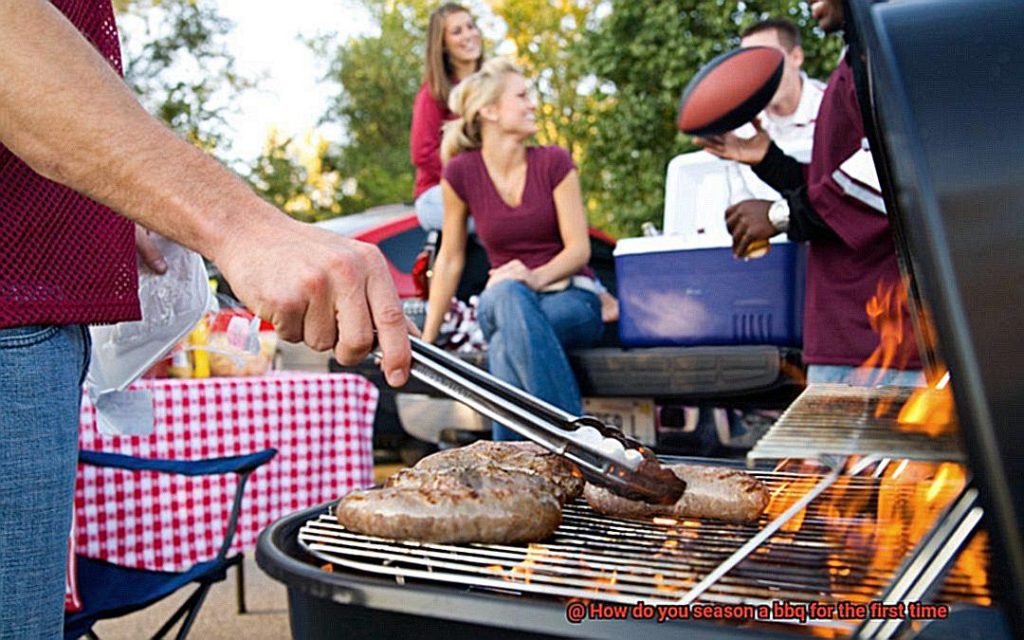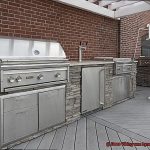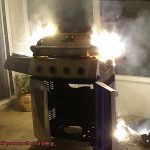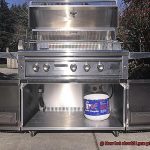Ah, summer. The season of sunshine, warm breezes, and outdoor gatherings with loved ones. And what better way to celebrate than with a mouth-watering BBQ? Whether you’re a seasoned grill master or a newbie, there’s one crucial step you must take before firing up those coals: seasoning your grill.
Why is this so important, you ask? Well, for starters, it creates a non-stick surface that prevents your food from sticking to the grates. Plus, it helps prevent rust and adds that irresistible smoky flavor we all love.
But fear not – seasoning your BBQ is easier than flipping a burger. One fun technique involves using a common household ingredient: an onion. Simply slice it in half and rub it onto the grates to create a barrier that keeps your food from sticking while also adding subtle flavor.
Another classic method involves coating the grates in oil and heating the BBQ for 20-30 minutes. This burns off any residue left over from manufacturing and creates a protective layer that enhances the taste of your food.
So don your apron, grab some tongs, and get ready for some serious grilling action. With these simple tips on how to season your grill for the first time, you’ll be churning out delicious meals in no time. Your taste buds will thank you – trust us.
Contents
Step 1: Clean the Grates with a Wire Brush
As you prepare to season your BBQ for the first time, it’s crucial to start with a clean slate. The first and most important step is to clean the grates with a wire brush. Skipping this step could result in unevenly cooked food that sticks to the grates and ruins your BBQ experience. Here are some tips for cleaning your grates like a pro:
- Step 1: Allow your grill to cool completely before you start cleaning the grates.
- Step 2: Use a wire brush to gently scrub the grates, removing any large pieces of debris or rust. Be sure to brush in the direction of the grates to avoid damaging them.
- Step 3: For any stubborn debris, use a scraper or putty knife to pry it off gently. However, be careful not to scrape too hard and damage the grates.
- Step 4: Once all visible debris is removed from the grates, give them a thorough cleaning by using warm, soapy water and a sponge or rag. Rinse the grates completely with water afterwards and dry them thoroughly before moving on to the next step.
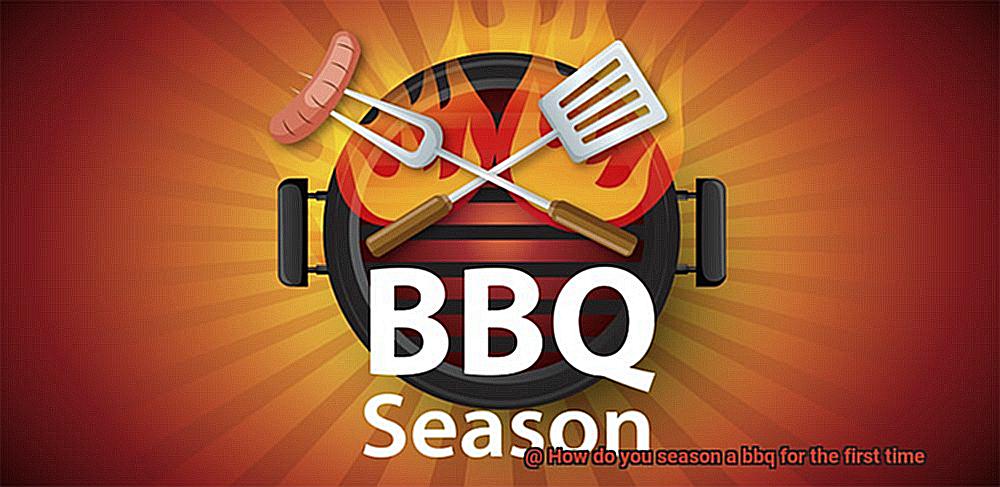
Step 2: Heat the BBQ to High Temperature
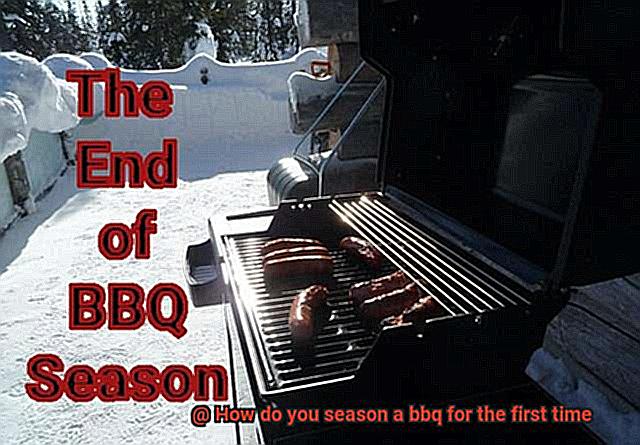
Before you get grilling, let’s make sure your BBQ is properly seasoned and ready to go. Step 2: Heating the BBQ to High Temperature is crucial for a perfectly cooked meal.
First, let’s give that grill a thorough cleaning. Use a grill brush to remove any debris from previous use, and wipe down the grates with warm soapy water and rinse thoroughly. We don’t want any lingering residue ruining your meal.
Now, it’s time to turn up the heat. Turn all burners to their highest setting and close the lid. Let your grill heat up for 10-15 minutes, allowing any excess oils or chemicals from the manufacturing process to burn off.
After heating up, turn off the burners and allow the grill to cool down completely. Take your grill brush and give it one last scrub down to remove any remaining debris.
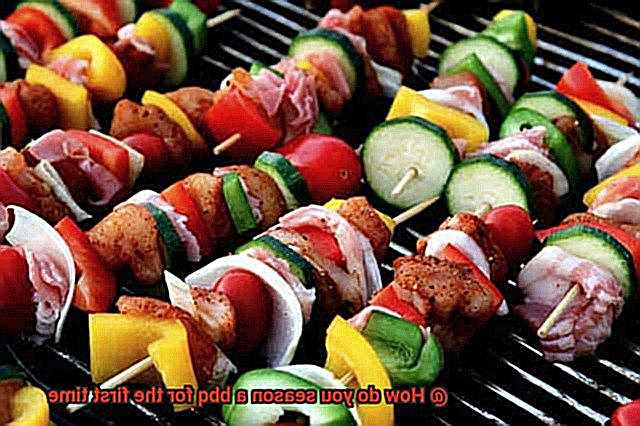
Remember, this step must be repeated every time you use your grill to ensure it is clean and ready for cooking. Don’t forget to oil the grates before each use to prevent food from sticking and ensure a perfectly cooked meal every time.
Step 3: Let the BBQ Cool Down
Now, before you start cooking up a storm, there’s one more crucial step to take – letting your grill cool down. Not only does this prevent any potential burns or injuries, but it also ensures that any remaining debris or ash can be easily removed.
To cool down your BBQ, simply turn off the heat source and let the grill sit for at least 30 minutes to an hour. It’s important to keep children and pets away from the grill during this time to avoid any accidents. Once the grill has cooled down, you can use a wire brush to thoroughly clean the grates and remove any remaining debris or ash.
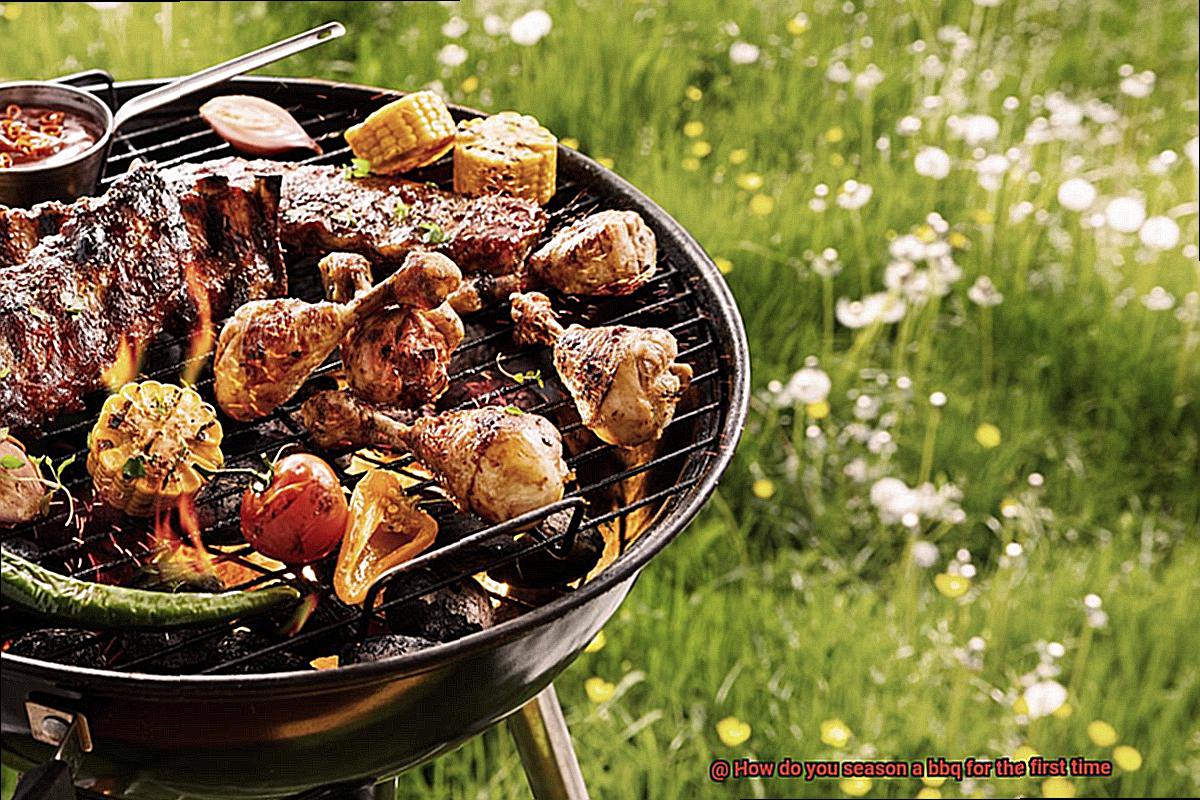
Why is this step so important? Well, for starters, handling a hot grill can be dangerous and lead to burns or other injuries. Additionally, any remaining debris or ash can negatively affect the taste and quality of future food cooked on the grill. So taking the time to cool down and clean your grill properly is well worth the effort.
Step 4: Apply a Coat of Oil to the Grates
This step is crucial in protecting your grill from rust and preventing food from sticking to the grates during cooking.
Before you apply the oil, make sure your grates are free of any debris or particles. Use a wire brush or grill scraper to remove any remaining residue. Once you’ve cleaned the grates, use a paper towel or brush to apply a thin coat of oil.
Choosing the right oil is important. Avoid vegetable or olive oil as they have a low smoke point and can easily burn, leaving an unpleasant taste on your food. Instead, opt for oils with high smoke points like canola, grapeseed, or peanut oil.
After applying the oil, let it sit for 15-20 minutes to allow it to penetrate the grates and create a non-stick surface. This will make cooking up your favorite foods much easier. And once you’re done seasoning your BBQ, it’s time to start cooking.
Step 5: Reheat and Allow to Cool Again
So, you’ve spent hours scrubbing and seasoning your BBQ grill to perfection. But, hold on there, cowboy. There’s one more vital step that you don’t want to overlook: reheat and allow your BBQ grill to cool again.
But why is this step so important? Well, the answer is straightforward. By reheating your grill, you’re ensuring that the oil you used for seasoning has completely seeped into the metal. This helps prevent rust and other issues that can arise from moisture getting into your grill. Additionally, it creates a protective layer that makes cooking your favorite meals as easy as pie.
However, that’s not all. Allowing your grill to cool down after reheating is equally crucial. This gives the oil time to solidify and create an even stronger protective layer on the surface of the metal. And if you notice some smoke or a slight smell during this process – don’t worry. It’s entirely normal and indicates that the oil is being absorbed into the metal.
Once your grill has cooled down, repeating this process one more time is an option if you want to be extra cautious (who doesn’t love their grill lasting for years to come?). Even if you skip this step, cleaning your grill after every use and re-oiling it periodically maintains its protective layer. Your taste buds will thank you.
In addition to reheating and cooling down your grill, there are other measures to keep it in tip-top shape. These include:
- Cleaning your grill after each use
- Re-oiling it periodically
- Covering it when not in use
By following these tips and taking proper care of your grill, you can enjoy mouth-watering grilled food all summer long.
Tips for Regular Seasoning and Maintenance
As a BBQ lover, you know that there’s nothing quite like the taste of grilled food on a warm summer day. To ensure that your grill stays in top condition and continues to produce delicious food, regular seasoning and maintenance are essential. Here are five tips for maintaining your grill:
Clean Your Grill After Every Use
Cleaning your grill after every use is one of the most important things you can do to maintain it. Grease and food particles can build up over time, leading to rust and other issues. Use a grill brush or scraper to remove any debris from the grates, and apply a light coating of cooking oil to prevent rust.
Inspect Your Grill Regularly
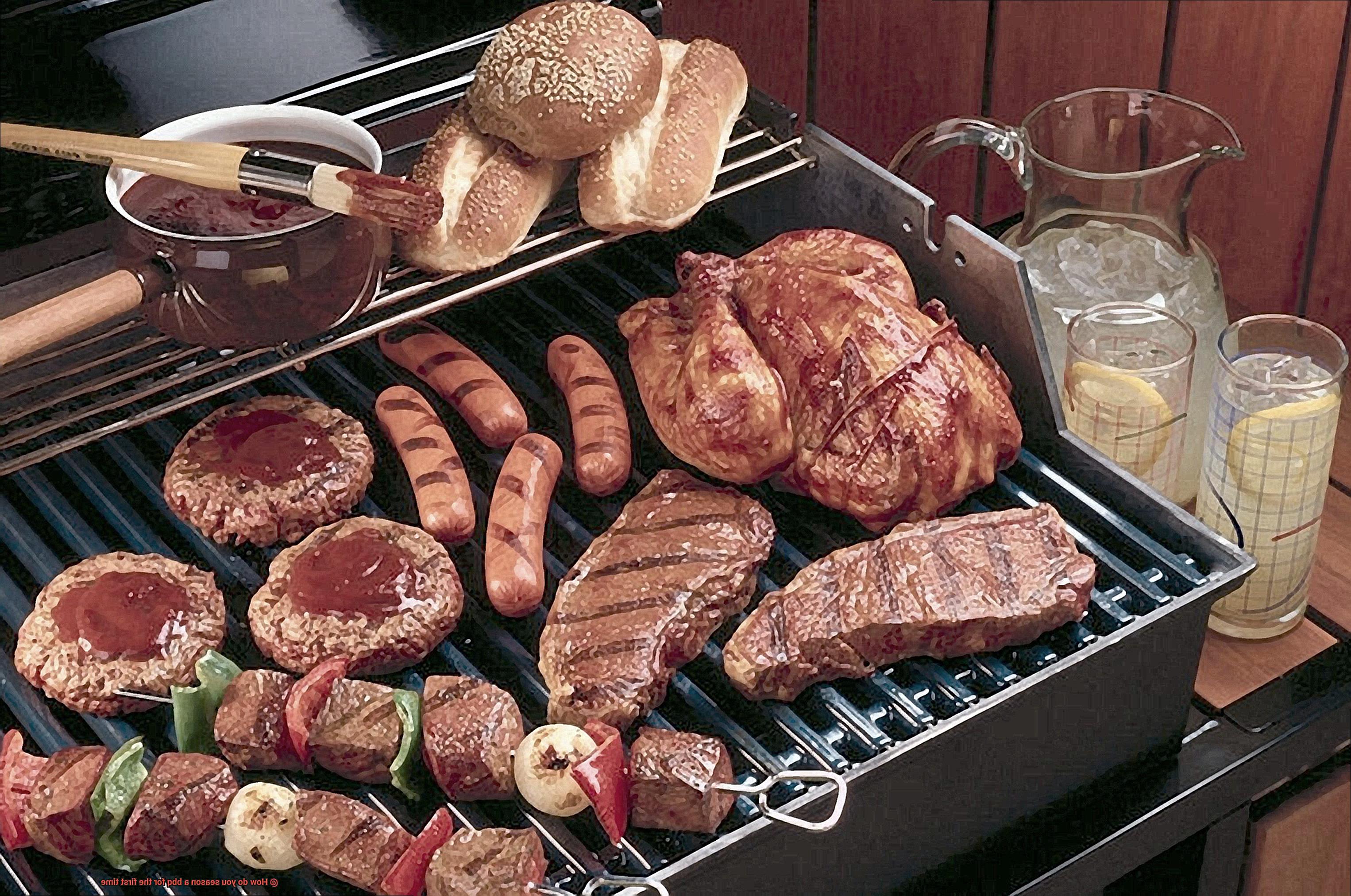
Inspecting your grill regularly for signs of wear and tear is crucial. Check the grates, burners, and other components for cracks, rust, or corrosion. If you spot any damage, replace the parts as soon as possible to prevent further harm.
Check the Gas Connections
If you have a gas grill, checking the gas connections regularly is a crucial safety measure. Ensure they are tight and secure, and there are no leaks. Gas leaks can be hazardous, so address any issues immediately.
Oil the Grates
Before cooking on your grill, oiling the grates with high-heat oil like vegetable or canola oil will prevent food from sticking and make cleanup easier.
Cover Your Grill
When not in use, covering your grill will protect it from elements and prevent moisture from accumulating inside it. Moisture can cause rust and corrosion that will weaken the components of your grill over time.
Invest in a Good Quality Grill Cleaner
Lastly, investing in a good quality grill cleaner is an excellent way to ensure that your BBQ stays in top condition for years to come. It will break down any grease or food particles that may have built up on your grill over time, preventing rust and other damage. Always follow the manufacturer’s instructions when using a grill cleaner to avoid damaging your grill.
Benefits of Properly Seasoned BBQs
Look no further. As an expert on the benefits of properly seasoned BBQs, I’m here to share some valuable insights with you.
Properly seasoning your BBQ is not just about enhancing the flavor of your grilled food. It’s also about protecting your grill from rusting and corrosion caused by exposure to moisture and the elements. By creating a barrier, seasoning helps extend the lifespan of your grill.
But that’s not all. A well-seasoned BBQ creates a non-stick surface, making cooking and cleaning a breeze. No more struggling to remove stubborn bits of food from the grates or dealing with unevenly cooked meals. Say goodbye to those frustrating moments and hello to perfectly grilled food.
Seasoning also helps regulate the temperature of your grill, ensuring even heat distribution across the grates. This prevents hot spots that can lead to burnt or undercooked food, guaranteeing that your meals will be cooked to perfection every time.
In addition, seasoning helps eliminate any unwanted odors or flavors that may have accumulated on the grill over time. Whether you’re using a second-hand grill or haven’t used it in a while, seasoning will ensure that your food tastes fresh and delicious.
Common Mistakes to Avoid When Seasoning Your BBQ
As you gear up to season your grill for the first time, make sure to avoid some common mistakes that can ruin your food and damage your BBQ. Here are some tips to keep in mind:
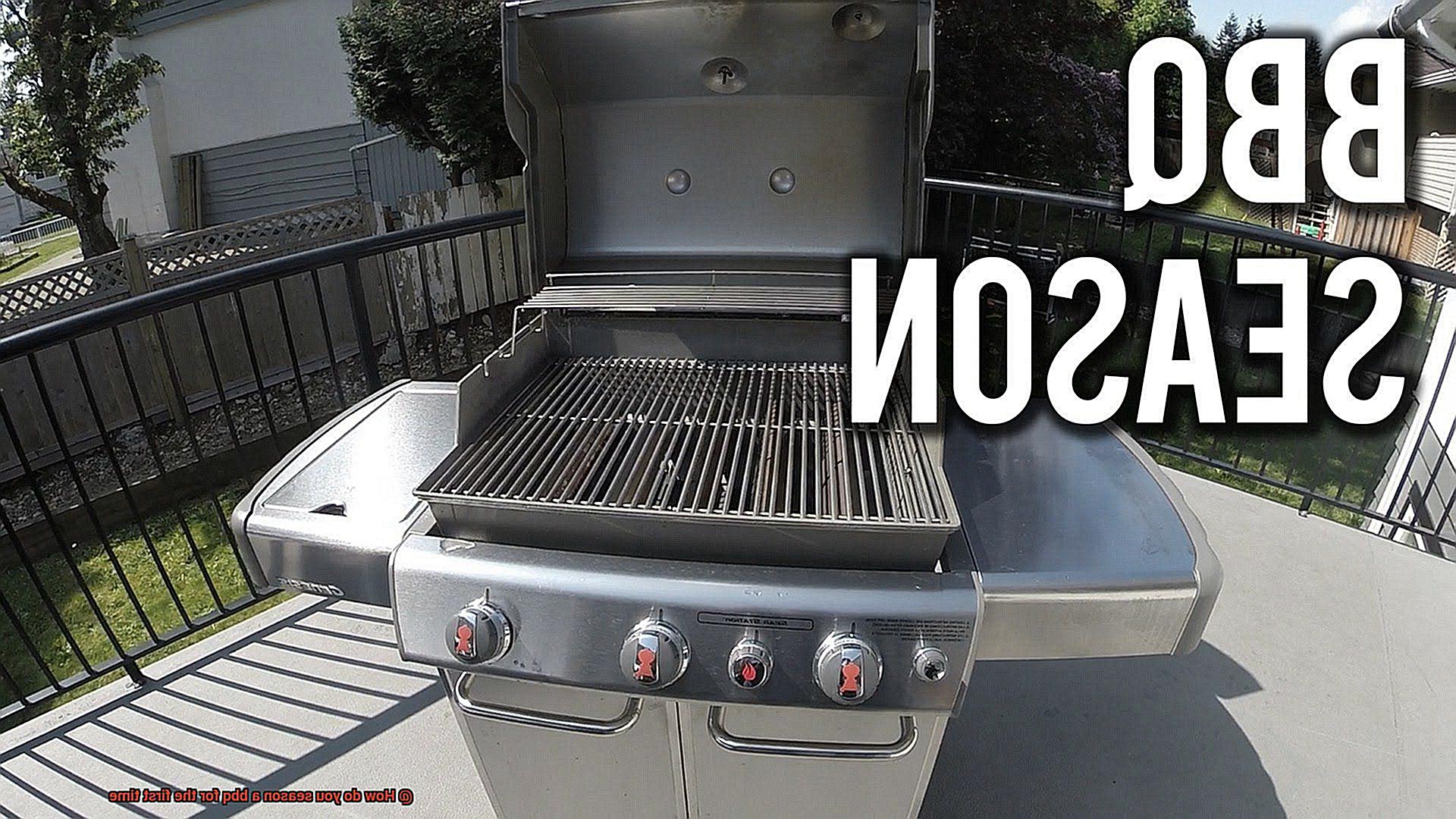
Firstly, don’t overlook the importance of cleaning. Before seasoning your BBQ, make sure to clean it thoroughly to remove any rust, debris, or grime that may have accumulated. Skipping this step can lead to uneven seasoning and even cause food contamination. So, grab a sturdy brush and give your grill a good scrub-down.
Next up, watch your oil usage. While oil is a crucial ingredient in the seasoning process, too much of it can cause flare-ups and smoke that can affect the flavor of your food. So, use just enough oil to coat the grill grates evenly and avoid drenching them.
Moreover, not all oils are created equal when it comes to seasoning your BBQ. Steer clear of low smoke point oils such as vegetable or olive oil, as they can quickly turn rancid and create a foul taste in your food. Instead, opt for high smoke point oils like canola or peanut oil that can withstand high temperatures and won’t impart any unwanted flavors.
Last but not least, don’t forget about temperature. The temperature of your grill plays a pivotal role in how well it gets seasoned. Make sure to follow the manufacturer’s instructions and preheat your grill before seasoning it. This will ensure that the seasoning sticks properly to the surface and creates a protective layer for your grill.
To sum it up, here’s a quick checklist of things to keep in mind when seasoning your BBQ:
- Clean your grill thoroughly before seasoning
- Use just enough high smoke point oil
- Preheat your grill before seasoning
v2WoiAUlIIE” >
Conclusion
In conclusion, seasoning your BBQ grill is an absolute must if you want to cook up a storm and keep your grill in tip-top shape. The five essential steps to seasoning your grill include cleaning the grates with a wire brush, heating the BBQ to high temperature, letting it cool down, applying a coat of oil to the grates, and reheating and cooling down again. These steps will not only ensure perfect cooking results but also protect your grill from rust and other damages.
To maintain your BBQ’s longevity, regular maintenance is key. This includes cleaning after every use, inspecting for wear and tear, checking gas connections, oiling the grates before cooking, covering when not in use, and investing in a good quality grill cleaner. By avoiding common mistakes such as overlooking cleaning or using too much oil or low smoke point oils during seasoning, you can keep your grill in pristine condition for years to come.
With these tips in mind, it’s time to get those tongs ready for some serious grilling action.

